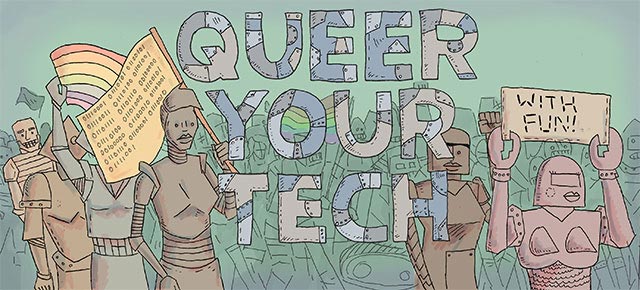
I have been nervous about this for a very long time. Net Neutrality is super important to me. Just a quick primer on what Net Neutrality means: the idea that all internet content should be treated equally, and that ISPs and governments shouldn’t be charging different users, companies or content differently or otherwise discriminating against users, companies or individual websites.
On January 14, 2014, Net Neutrality suffered a massive blow when a United States Federal Appeals Court gutted laws that keep our internet service providers (ISPs) from blocking or slowing down lawful content online. The Federal Communications Commission had the opportunity to do an end run around that terrible ruling by reclassifying the internet, or supporting this crazy dystopian novel that we saw being written before us. The FCC held a comment period where the people spoke for or against Net Neutrality. And speak they did — the response was massive and unheard of, with only 1% of commenters arguing against Net Neutrality. In fact, some of you commented during this period. Thank you for that. And through all of this, my opinion has remained the same — nervous, pessimistic.
As I wrote when I first covered this issue, “my faith that this will just right itself isn’t strong.” Especially when one considers that originally the FCC proposal did include internet fast lanes and slow lanes, and that Tom Wheeler (chairman of the FCC) used to run the telecommunications lobbying arm.
I am very happy that my predictions were wrong.
On February 26th, The FCC approved three-to-two the strongest protections of Net Neutrality that America has ever seen. According to the BBC’s excellent reporting, the following list of rules now apply to the internet and ISPs:
- Broadband access is being reclassified as a telecommunications service, meaning it will be subject to much heavier regulation
- Broadband providers cannot block or speed up connections for a fee
- Internet providers cannot strike deals with content firms, known as paid prioritisation, for smoother delivery of traffic to consumers
- Interconnection deals, where content companies pay broadband providers to connect to their networks, will also be regulated
- Firms which feel that unjust fees have been levied can complain to the FCC. Each one will be dealt with on a case by case basis
- All of the rules will also apply to mobile providers as well as fixed line providers
- The FCC won’t apply some sections of the new rules, including price controls
To unpack a couple of these bullet points, being classified as a telecommunications service means that, like telephone service, the internet is so tied to public good that the company has an obligation to serve everyone equally. Mobile data providers are held to these standards as well, which our resident Queer Engineer Laura Mandanas pointed out to me is especially important, because people of color and working class people tend to rely more heavily on mobile internet solutions than computers. And the FCC, despite many conservative people literally lying, is not setting prices for internet. Essentially, the rules echo the advice President Obama laid out a few months ago.
In other words, Net Neutrality Lives!

But wait wait wait, not so fast. My nervousness and the ISPs hopes and dreams of cray cray profit don’t die quite so easily. Internet Service Providers have already threatened immediate legal action, which is scary — it was a Verizon law suit that overturned the previous net neutrality rules. And Republican Congress is already brewing up some nasty concoctions that take the teeth out of the FCC regulations.
What I’m saying is we can breathe a sigh of relief that Net Neutrality lives to fight another day. But there be more days of fighting. In the words of Mad Eye Moody:

This has been the one-hundred-nineteenth installment of Queer Your Tech with Fun, Autostraddle’s nerdy tech column. Not everything we cover is queer per se, but we talk about customizing this awesome technology you’ve got. Having it our way, expressing our appy selves just like we do with our identities. Here we can talk about anything from app recommendations to choosing a wireless printer to web sites you have to bookmark to any other fun shit we can do with technology. Header by Rory Midhani. Feature image via Shutterstock.








Comments
My biggest concern is that they may still try to do some last lane charges, or say we now have to limit data for most people to 300gb a month, unless they start paying more(kind of like how it is in Canada right now). Not to mention AT&T and Verizon both have been ignoring rules and regulations that have been sanctioned to them for years(re the Verizon, & the 700MHz auction they won that had a provision that said something to the effect they are required to accept unlocked devices, but that isn’t case).
Also, AT&T has said while they will try to sue to get this blocked, they’ve also said that this changes nothing in their plans and roll out. Additionally, Verizon(not wireless) has been already been taking federal money under Title II(because they argued internet is a utility for the sole purpose of getting federal model) provision that allows utilities to take federal money to build out/expand their service.
Also, let not forget the FCC said that states cannot ban municipal broadband, which 19 states had banned(mostly at the request of ISP providers like Comcast and AT&T). In fact in terms of lobbying dollars nationwide and in many states Comcast is in the top 10.
You’re showing joy and optimism over the definition of what “net neutrality” literally means. However, how can you have an opinion either way, without knowing what’s actually in the bill?
The FCC refused to show (or even testify to congress) any details of the bills. Some former and current FCC employees have indicated that although they are not allowed to show us the contents, they wanted to come forward and state that the bill is not what it seems (and is actually pretty scary).
You need to ask yourself: why was congress not allowed to read the bill? Why did they refuse to testify about the contents of the bill to congress?
You are happy based on what you think this bill stands for. As a concept, net neutrality is a wonderful idea. However, I have my doubts that “net neutrality” will be as it should, now that the FCC is in charge.
There’s a massive potential for abuse. I urge that you all educate yourself on the contents of the bill (not what you’re told, but what’s written down verbatim), before you proclaim this as a victory.
Obviously, I hope that I’m wrong. But with the way things are going, it’s not looking good.
i am also shocked that this passed, in a country that refuses to do anything about global warming and is still trying to pass laws blocking the teaching of evolution in public schools. i guess making an internet utility greases enough palms to allow net neutrality to be favorable to the big political players overall. Having net neutrality is so important to me for maintaining access to ppl who wouldn’t have the financial resources otherwise, especially working-class students, and political activists like the Arab Spring supporters and Ai WeiWei.
I expect there will be some negative consequences that we don’t know about yet, maybe along the lines of having it easier for NSA to access info if the internet becomes a federalized utility. But I’m hoping instead it’s just one of those flukes that occasionally happens in this country that is actually good, like when we elected Obama twice, and passed national health care (still can’t believe either of those things happened). So, fingers crossed Wheeler and the rest can actually put forward good legislation and slow the gentrification of web access.
make more easier to get heroes of the storm free beta key and access all the code for heroes of the storm and you should unlock all the character for this game.
My feelings about this are really pretty much summarized by the title of the article. I’m combination surprised (very)/excited/not-really-trusting-this. I’ve been dealing with Internet from 9-5 under CIPA and some really stringent state laws, so I guess I’m kind of worried that, regardless of what the FCC says/does, laws and regulations like that will still pop up and enable runarounds that still manage to restrict all sorts of stuff, pretty much at will and according to legislative whimsy. Of course, it’s also true that not only is my glass half-empty, the water is also contaminated. So.